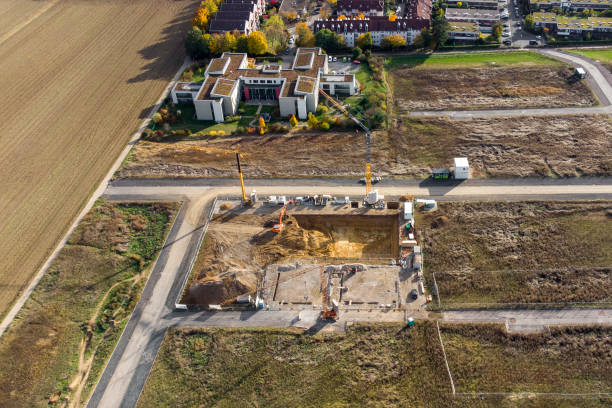What is considered illegal land use in Spain and in the Balearic Islands?
Illegal land use occurs when an individual or legal entity uses land for purposes other than those authorized by applicable urban planning regulations. In other words, it refers to carrying out activities or constructions not permitted under current planning regulations. This type of violation is especially relevant in the Balearic Islands, where protecting the land and rural territory is a legal and environmental priority.
Under Spanish law, land use is regulated by the national Land Law and the regional urban planning legislation, in this case, by the Urban Planning Law of the Balearic Islands (LUIB). This legislation establishes which uses are allowed, which require prior permits, and which are outright prohibited—especially in protected rural areas, natural spaces, or zones of special landscape interest.
Some common examples of illegal land use include:
- Illegal constructions or buildings on non-developable land without a permit.
- Agricultural or livestock activities converted into residential use.
- Installation of prefabricated homes, pools, or storage units without authorization.
- Tourist exploitation of properties in areas not designated for such use.
Properly identifying the designated urban use of a property is the first step to avoid penalties, since any action that goes against that use may lead to fines, restoration orders, and loss of rights over the property.
Common illegal land use situations in the Balearic Islands
In the Balearic Islands, where land value is especially high and urban planning regulations are strict, illegal land uses have become a recurring issue. The following are some of the most frequent situations detected by town halls and urban inspection services:
- Construction of illegal buildings on protected rural land: One of the most serious cases. This involves building homes, prefabricated houses, pools, or fixed structures without a permit on land classified as non-developable or environmentally protected.
- Conversion of agricultural land into residential use: Sometimes what starts as a small auxiliary structure (such as an agricultural shed or tool hut) becomes a concealed residence, which violates planning regulations.
- Installation of mobile homes or caravans as permanent dwellings: Although these structures may appear temporary, their continued residential use and connection to utilities may be considered illegal construction.
- Unauthorized tourist use: On properties located on non-developable land or outside regulated tourist zones, using them as holiday rentals without a license may be considered illegal land use.
- Unlicensed construction on urban properties: Even on urban land, carrying out extensions, structural renovations, or changes of use (e.g., from garage to dwelling) without the required municipal permit also constitutes an urban planning violation.

These practices not only lead to legal problems, but may also result in fines for illegal construction, demolition orders, or even the inability to register the property in the Land Registry.
Legal consequences of illegal land use in the Balearic Islands
Illegal land use in the Balearic Islands carries serious legal consequences, especially in cases of illegal construction or unlicensed building on non-developable or protected land. The Balearic urban planning regulations, mainly established in the Urban Planning Law 12/2017 of the Balearic Islands (LUIB), set out a clear sanctioning regime for these types of violations.
The main legal consequences include:
- Fines for illegal construction: Financial penalties may range from 50% to 300% of the value of the illegal work or use. Fines for unlicensed construction on protected rural land are particularly high and can exceed €100,000 in the most serious cases.
- Demolition of illegal buildings: The administration may order the restoration of urban planning legality, which involves total or partial demolition of works carried out without a permit. This order can be issued even years after the violation, as long as it has not expired.
- Liability of the developer and the property owner: The law stipulates that not only the developer or builder is responsible, but also the current owner of the property, even if they acquired it later. This can severely affect good-faith buyers who did not check the urban planning status of the property.
- Annotations in the Land Registry: Administrative sanction and restoration resolutions may be recorded in the registry, affecting the property’s market value and preventing its sale or use as collateral for a mortgage.
- Inability to legalize the construction: On protected land or where the use is not permitted, the law prohibits any subsequent regularization, leaving the owner with no option but to comply with demolition orders.
These consequences can be avoided or mitigated if action is taken quickly and with the guidance of a lawyer specialized in urban planning violations who understands the current regulations in the Balearic Islands and can propose viable legal solutions.
When does an illegal construction become time-barred in the Balearic Islands?
The statute of limitations for illegal construction in the Balearic Islands depends on the type of violation committed, the type of land where the construction took place, and whether protected assets are affected. The Urban Planning Law 12/2017 of the Balearic Islands (LUIB) regulates these time limits, distinguishing between urban planning violations and the obligation to restore legal order.
General limitation periods:
- Illegal constructions on urban or common developable land:
- Urban planning violations (such as building without a permit): expire after 8 years from the completion of the work.
- Fines for illegal construction also expire after 8 years if they have not been enforced within that period.
- Illegal constructions on protected rural land or areas with special restrictions (Natural Areas of Special Interest, forest land, etc.):
- They never expire. The obligation to restore legality is non-prescriptible, meaning the Administration may order demolition at any time, even decades later.

Important: expiration does not legalize the construction. While it may prevent a fine from being imposed, the building may still be considered illegal and cannot be registered in the Land Registry or obtain occupancy permits or utility connections without prior legalization.
Therefore, if you own or plan to acquire an illegal construction in the Balearic Islands, it is essential to obtain a legal-urban planning report to determine whether the violation is time-barred and whether legal regularization is possible.
How to legalize an illegal construction or unauthorized land use in the Balearic Islands
Legalizing a construction without a permit or unauthorized land use in the Balearic Islands is a legal process that may be feasible, depending on several key factors: the type of land, the current state of the building, and whether the urban planning violations have expired. The goal of this process is to bring a building or activity from an irregular situation into full compliance with current urban planning laws.
Steps to attempt legalization:
- Preliminary urban planning analysis: A technical-legal report must be prepared to determine whether the construction can undergo a legalization process or is subject to penalties and demolition.
- Verification of land classification: On protected rural land, legalization is usually not possible. However, on urban or developable land, regularization through a legalization permit may be possible if requirements are met.
- Certification of expiration: In some cases, legalization may be requested by claiming the expiration of the violation if more than eight years have passed since the work was completed and the land is not environmentally protected.
- Application for a legalization permit: A technical project must be submitted to the Town Hall, reflecting the current state of the property and proposing its adjustment to the applicable regulations.
- Payment of fines or fees: In some cases, the Administration may require payment of an urban planning fine to allow the legalization process.
Legal recommendation: If you find yourself in this situation, the most prudent step is to contact lawyers specialized in urban planning law in the Balearic Islands, as each municipality may have its own specific ordinances. Professional legal advice will make the difference between demolition and the possibility of preserving your property.

Professional Recommendations on Illegal Constructions and Land Use in the Balearic Islands
Illegal constructions and unauthorized land use in the Balearic Islands remain one of the most pressing concerns for property owners, developers, and local authorities. While it is possible for such constructions to become time-barred under the law, this does not necessarily mean they can be legalized or are exempt from penalties. Regional and municipal regulations are increasingly strict when it comes to protecting the territory—especially in rural areas, protected natural zones, or rustic land.
Fines for illegal construction can be extremely high—reaching up to 250% of the value of the work in some cases—and the statute of limitations only applies when there is no significant environmental, cultural, or landscape impact. Assuming that an illegal building will become legal “over time” can result in a serious legal and financial mistake.
At Rodríguez Tur Abogados, we recommend:
- Do not carry out construction without a permit or alter land use without prior urban planning assessment.
- Consult a specialized lawyer if you inherit or purchase a property that may be affected by these types of irregularities.
- Begin reviewing the property’s urban planning status as soon as possible, especially if you are approaching the statute of limitations period.
Our experience in defending against urban planning violations in the Balearic Islands and in legalizing illegal constructions allows us to offer safe, customized solutions for each case. Contact us for a consultation and protect your property in full compliance with the law.




